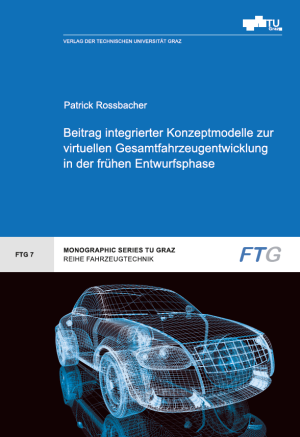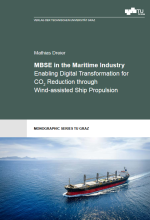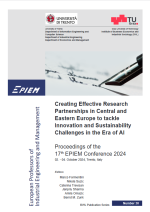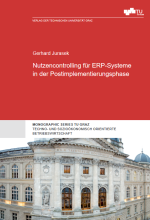Today, automotive development has to face a broad spectrum of numerous exciting challenges. For instance, the imminent shortage of fossil energy in combination with the increasing urbanisation leads to discussions in the direction of alternative and innovative drive-trains, usage of regenerative energy sources and lighter as well as more efficient cars. This causes automotive companies to think about new vehicle architectures, which can be flexibly adapted to the specific market and customer needs. Because of today’s globalisation of the automotive customer market, vehicle producers have to face a growing number of competitors. This leads to the attempt to reduce the required development time, to be present on the global market with innovative product solutions as fast as possible. From the process point of view there are two basic mechanisms, which are used simultaneously to meet this challenge: On the one hand there are strong efforts to increase the product knowledge in early phases of the development process (front-loading). On the other hand there are attempts to parallelise specific sections of the development process, in order to reduce the required development time or to use the gained time to analyse more concept variants (concurrent engineering). This has extensive implications on the entire vehicle: The so called vehicle architecture department is accounted for the overall physical representation of the vehicle. This department defines the authorised technological spaces within the car and moderates spatial conflicts during the technical development and solution finding process. Because of the increasing number of vehicle functions and rising demands the available technical space within the car decreases despite the trend of rising exterior dimensions. This requires the exploration of functional aspects of the vehicle concept besides the traditional sole geometrical considerations already in the preliminary development phase. In order to support the entire vehicle development in the early concept phase, a novel approach for an integrated concept model is introduced. The basic idea of the approach is to enable a consistent interconnection between CAx-applications and expert tools in the context of the entire vehicle, in order to allow the efficient evaluation of geometrical and functional vehicle aspects of a concept. Because of the strong geometric focus of a vehicle architecture department, the core of the approach is a parametric-associative master-model, which contains all essential elements for the representation of the geometrical aspects of a concept. The use of interfaces and automation-based routines allows the bidirectional linkage with calculations and simulation models with the master-model. The master-model is fully maintained by implemented control routines, which allows the provision of a flexible parametrisation within the integrated concept model. This enables a variable adaptation of the implemented model relations according to the requirements of the concept. Furthermore, the data model allows the representation of different states (e.g. target-state, current-state), in order to satisfy the process-related demands within the conceptual development. Besides the representation of a virtual vehicle model, the presented approach offers a knowledge-based dimension. The application of a specialised evaluation system and archiving logic allows the storage of the engineering knowledge generated during the conceptual development. This supports an efficient and comprehensible reuse of the engineering knowledge in later project phases or in new vehicle projects.par
The practical realisation of the stated approach is shown by means of selected examples in the area of conceptual development.
Issue: Open Access E-Book
ISBN: 978-3-85125-731-1
Scope: 276 pages
Language: Deutsch
Release date: March 2020
Series: Monographic Series TU Graz / Reihe Fahrzeugtechnik, Issue 7
Today, automotive development has to face a broad spectrum of numerous exciting challenges. For instance, the imminent shortage of fossil energy in combination with the increasing urbanisation leads to discussions in the direction of alternative and innovative drive-trains, usage of regenerative energy sources and lighter as well as more efficient cars. This causes automotive companies to think about new vehicle architectures, which can be flexibly adapted to the specific market and customer needs. Because of today’s globalisation of the automotive customer market, vehicle producers have to face a growing number of competitors. This leads to the attempt to reduce the required development time, to be present on the global market with innovative product solutions as fast as possible. From the process point of view there are two basic mechanisms, which are used simultaneously to meet this challenge: On the one hand there are strong efforts to increase the product knowledge in early phases of the development process (front-loading). On the other hand there are attempts to parallelise specific sections of the development process, in order to reduce the required development time or to use the gained time to analyse more concept variants (concurrent engineering). This has extensive implications on the entire vehicle: The so called vehicle architecture department is accounted for the overall physical representation of the vehicle. This department defines the authorised technological spaces within the car and moderates spatial conflicts during the technical development and solution finding process. Because of the increasing number of vehicle functions and rising demands the available technical space within the car decreases despite the trend of rising exterior dimensions. This requires the exploration of functional aspects of the vehicle concept besides the traditional sole geometrical considerations already in the preliminary development phase. In order to support the entire vehicle development in the early concept phase, a novel approach for an integrated concept model is introduced. The basic idea of the approach is to enable a consistent interconnection between CAx-applications and expert tools in the context of the entire vehicle, in order to allow the efficient evaluation of geometrical and functional vehicle aspects of a concept. Because of the strong geometric focus of a vehicle architecture department, the core of the approach is a parametric-associative master-model, which contains all essential elements for the representation of the geometrical aspects of a concept. The use of interfaces and automation-based routines allows the bidirectional linkage with calculations and simulation models with the master-model. The master-model is fully maintained by implemented control routines, which allows the provision of a flexible parametrisation within the integrated concept model. This enables a variable adaptation of the implemented model relations according to the requirements of the concept. Furthermore, the data model allows the representation of different states (e.g. target-state, current-state), in order to satisfy the process-related demands within the conceptual development. Besides the representation of a virtual vehicle model, the presented approach offers a knowledge-based dimension. The application of a specialised evaluation system and archiving logic allows the storage of the engineering knowledge generated during the conceptual development. This supports an efficient and comprehensible reuse of the engineering knowledge in later project phases or in new vehicle projects.par
The practical realisation of the stated approach is shown by means of selected examples in the area of conceptual development.
These could also be of interest to you
- Catalog
- New releases
-
Open Access publications

- Enhanced e-books
-
Series
- Akademische Reden an der Technischen Universität Graz
- Arbeitshilfen für die Praxis
- Archiv und Bibliothek
- Betonkolloquium
- Buddhist Architecture in the Western Himalayas
- BWL Schriftenreihe
- Electrical Power Systems
- Fachbücher Planung und Bau
- Facts & Figures
- Festschriften TU Graz
- Forschungsreihe IBBW
- Forum Technik und Gesellschaft
- Geodesy
- Immersive Learning Research Network Conference; Workshop, short papers, poster
- Institut für Gebäudelehre Jahrbuch
- International Brain-Computer Interface (BCI) Meeting
- LM.VM.2014
- Logistik Werkstatt Graz
- Materialien zu Schwerpunkten am Institut für Gebäudelehre
- Mathematical Modelling of Weld Phenomena
- Monographic Series TU Graz
- Monographic Series TU Graz|Advanced Materials Science
- Monographic Series TU Graz|Computation in Engineering and Science
- Monographic Series TU Graz|Production Science and Management
- Monographic Series TU Graz|Railway Research
- Monographic Series TU Graz|Reihe Fahrzeugtechnik
- Monographic Series TU Graz|Schriftenreihe des Instituts Betonbau
- Monographic Series TU Graz|Structural Analysis
- Monographic Series TU Graz|Techno- und sozioökonomisch orientierte Betriebswirtschaft
- Monographic Series TU Graz|Technoökonomie und industrielles Management
- Monographic Series TU Graz|Timber Engineering & Technology
- November Talks
- Proceedings of the International Brain-Computer Interface
- Schriftenreihe des Instituts für Baubetrieb und Bauwirtschaft
- Schriftenreihe des Instituts für Straßen- und Verkehrswesen
- Schriftenreihe des Instituts für Wohnbau der TU Graz
- Schriftenreihe zur Wasserwirtschaft
- Science, Technology and Society online
- Seminarreihe Bauunternehmensführung
- Studien zur Architektur | TU Graz
- Textbook Series
- Transform Industry: Guiding the transformation of SMEs
- TU Graz Jahresbericht | Annual report
- TU Graz people
- TU Graz Research
- VKM-THD Mitteilungen; IVT-Mitteilungen ab Bd. 100
- Authors
- Sale
Contact
Verlag der
Technischen Universität Graz
Technikerstraße 4
8010 Graz, Österreich
UID(VAT) ATU 57477929
contact person
Gabriele Groß
Tel.: +43(0)316 873 6157
E-Mail: verlag [ at ] tugraz.at
Privacy Overview
Necessary cookies are absolutely essential for the website to function properly. These cookies ensure basic functionalities and security features of the website, anonymously.
| Cookie | Dauer | Beschreibung |
|---|---|---|
| cookielawinfo-checkbox-analytics | 11 months | This cookie is set by GDPR Cookie Consent plugin. The cookie is used to store the user consent for the cookies in the category "Analytics". |
| cookielawinfo-checkbox-functional | 11 months | The cookie is set by GDPR cookie consent to record the user consent for the cookies in the category "Functional". |
| cookielawinfo-checkbox-necessary | 11 months | This cookie is set by GDPR Cookie Consent plugin. The cookies is used to store the user consent for the cookies in the category "Necessary". |
| qtrans_front_language | 1 year | This cookie is set by qTranslate WordPress plugin. The cookie is used to manage the preferred language of the visitor. |
| viewed_cookie_policy | 11 months | The cookie is set by the GDPR Cookie Consent plugin and is used to store whether or not user has consented to the use of cookies. It does not store any personal data. |
| woocommerce_cart_hash | session | This cookie is set by WooCommerce. The cookie helps WooCommerce determine when cart contents/data changes. |
Analytical cookies are used to understand how visitors interact with the website. These cookies help provide information on metrics the number of visitors, bounce rate, traffic source, etc.
| Cookie | Dauer | Beschreibung |
|---|---|---|
| _pk_id | 1 year 27 days | Required for the operation of Matomo, an analysis tool that tracks and analyzes user behavior. |
| _pk_ref | 13 months | Required for the operation of Matomo, an analysis tool that tracks and analyzes user behavior. |
| _pk_ses | 30 minutes | Required for the operation of Matomo, an analysis tool that tracks and analyzes user behavior. |
Other uncategorized cookies are those that are being analyzed and have not been classified into a category as yet.
| Cookie | Dauer | Beschreibung |
|---|---|---|
| yt-remote-connected-devices | never | No description available. |
| yt-remote-device-id | never | No description available. |







